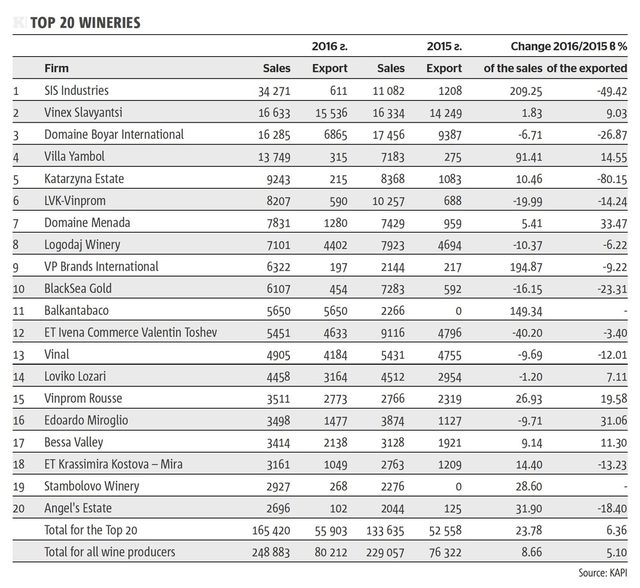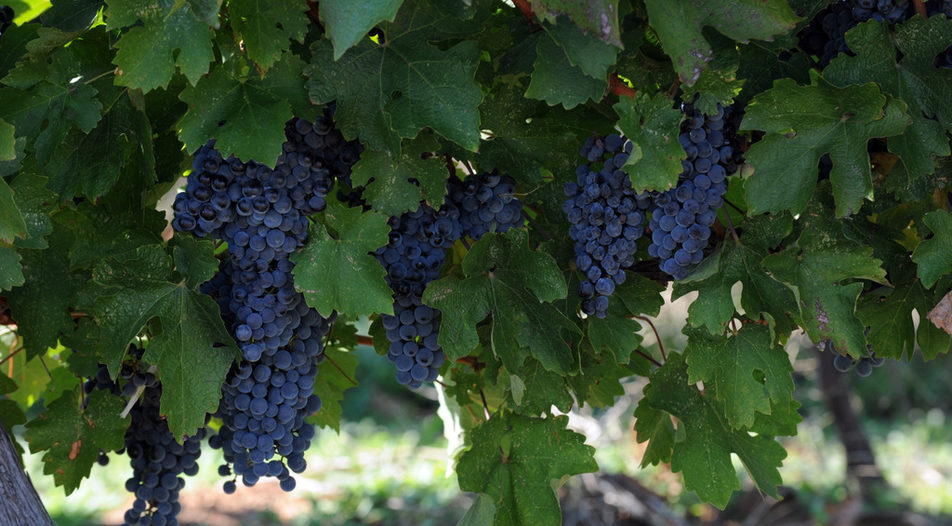• Bulgarian producers aim to improve the quality of their wines, partially due to heightened domestic requirements and disappearing non-demanding markets.
A smaller, yet better-quality 2017 grape harvest with a higher price have fueled a prediction of a more expensive and better wine in the Bulgarian winemaking sector. It has been growing at a moderate pace for some time now given that exports to Russia have almost disappeared. Last year's sales of the top 100 wineries stood at 250 million levs, of which around a quarter was sold abroad. This makes Bulgaria the eighth largest producer of grapes and the 10th largest winemaker in the EU. In 2016, customers spent 150 million levs on wine in shops, hotels and restaurants - well below 500 million levs paid for beer. In a nutshell, the wine market in the country has been slightly growing for some time now and the aspiration towards a higher diversity of destinations is a source of optimism.
Little, but good
According to Agriculture Ministry data, there are over 620,000 hectares of vineyards in Bulgaria. Despite a slight increase of the area compared to the previous two years, a retrospective analysis shows a sustained decline in the sector. For example, in 2008-2009 the area planted with grape vines exceeded 100,000 hectares, or 40% more than at present.
However, the smaller area under vines is not the sole reason for the expected lower grape harvest in 2017. Data provided by vine growers and wine producers show that unfavorable weather has taken its toll. In some regions, cold winter damaged vines. Dry summer weather has also had a negative effect at some places. These local problems are expected to cause an annual drop of 10-15 percent of the grape harvest, according to estimates of the sector. The Agriculture Ministry's official forecast shows that around 200,000 tonnes of grapes will be processed this year, compared to 211,000 tonnes last year.
However, the picture is not that pessimistic. The harvested white grape varieties are of a very high quality. The first reports about the red grape varieties also give grounds for optimism to expect wines of a higher quality.
"The grape harvest is smaller due to the cold winter but of a much better quality and with better technological indicators and it has not been affected by diseases, as the summer was dry," says Natalia Gadjeva of the Dragomir Winery, near Plovdiv. Winemakers and vine growers from other regions confirm that this is the case.
The combination of a smaller harvest and better quality has resulted in higher grape prices, which sector players estimate at 6-7 percent to 12 percent for the different varieties, or 1.0 to 1.5 levs per kilogram depending on the variety or the region. Some companies expect prices to rise further in the course of the campaign in case of a shortage of grapes from certain varieties.
Wines 2017: Faint optimism

Undoubtedly, the good technological parameters of the grape harvest are a prerequisite for production of wines of a higher quality during the current year. However, 2017 will not be easy for winemakers. On the one hand, production costs will increase, at least because of the more expensive input material but, on the other, strong competition on the market will deter a considerable growth of producer prices.
According to Krassimir Koev, executive director of the government's Executive Agency on Vine and Wine, a small drop of the grape harvest is expected but it will not lead to a reduction of wine production. He said that between 350,000 and 360,000 tonnes of grapes are harvested annually in Bulgaria, of which 175,000 tonnes were used to make wine last year, while the remainder was used for production of rakiya (a traditional Bulgarian type of brandy), vinegar and other products.
Agriculture Ministry figures show that Bulgaria produced over 126,000 hectoliters of wine in 2016. Koev said that in 2017 the wineries will crush over 200,000 tonnes of grapes into wine due to a higher number of orders from abroad. So, the country will make 140 million liters of wine compared to 127 million liters during the previous year, he noted.
The wine producers interviewed by Capital newspaper commented that the volumes produced this year will be similar to those in 2016 or slightly lower. "In terms of quality, the harvest is very good, particularly for the white and rose wines. The situation with the red grape varieties is more complicated due to the specific conditions for the proper ripening of grapes. Now is the time for the enologists to show their skills," Domaine Boyar's Executive Director, Evgeni Haramliiski, commented. As he put it, "the producer with the best enologists will have the wines of the highest quality".
Interest in higher quality
During the current crop year, several trends are expected to drive the domestic wine market, which marketing research agency Nielsen has estimated at around 153 million levs in the 12 months ended in mid-2017.
"We have been observing a trend of increasing consumption of wines made in wineries at the expense of home-made wines for the past few years," VP Brands International company (former Vinprom Peshtera wine and spirits producer) commented. The share of the low-price segment in total sales has been shrinking while the share of the average and premium segment has been increasing, the company said. Other producers have also noticed a trend of increasing purchases of high-quality wines by Bulgarian consumers. The domestic market is highly competitive, yet the company has marked a solid growth of sales of high-quality wines. "Consumers become ever more informed and start getting interested in the varieties, the way of processing the grapes," said Artur Grinover, sales director at Domain Menada.
"It may sound paradoxical but premium wines sell more easily on our market than those in the price range of up to 10 levs, or at least this is the case with small wineries," said Tanya Avramova of the Bratanov Winery. The rise in the number of foreign tourists visiting Bulgarian resorts and towns and the expansion of wine tourism also have their influence, she noted.
"As a traditional producer, we can say that the number of people buying high-quality wines has been rising although the pace is more modest than we would like it to be," Villa Yambol CEO Krassimir Avramov commented. He added that table wines still have a larger share on the market. In his view, interest in bottled wines is on the rise and interest in bag-in-box packs also remains high.
The companies also point out that consumption of white and rose wines has been growing in recent years and expect growth will continue. "White wines have become a year-round product with minimum seasonal variations in consumption - unlike red ones which mark a tangible drop in sales in the summer," said Domaine Boyar's Evgeni Haramliiski. According to market data, most wineries have sold out last year's output of rose wines and a gap in this segment is expected until wines from the new harvest hit the shelves.
"The new trends in the sector point to pure-variety wines, without oak," Tsvetelina Nikolova, Managing Director of Katarzyna Estate, said. Traditional Bulgarian varieties attract an increasingly higher attention from experts and consumers, she added. "Now, there is international demand for wines with lower alcohol content and shorter aging in oak barrels. The trend is towards light wines in which the natural taste of grapes is more tangibly felt but this is not quite applicable to Bulgaria where thicker wines are still in greater demand," Nikolova commented. However, Bulgarian producers expect demand for lighter wines to pick up at home as well, particularly among younger consumers.
Looking at many markets
Bulgarian wines are selling in more than 45 countries, with several of them having almost compete dominance, according to official export data. For some years now Poland has been the absolute leader in terms of imports of Bulgarian wines, with sales there exceeding those in the next four largest markets combined - Russia, Sweden, China and the United Kingdom (see the chart), according to data of the National Statistical Institute. According to sector players, Bulgaria's wine exports to Poland and Russia are positioned in the low-price segment, with red wine exports dominating. However, the share of sales of more expensive wines on other markets has begun to grow gradually, including the EU, China, the U.S., Japan.
"In the past 2-3 years, our clients in Europe have been showing increased interest in high-quality and more expensive Bulgarian wines, which however sell in small volumes. We can say that the European consumers are rediscovering Bulgaria in this respect but the process is only at its beginning," says Evgeni Haramliiski of Domaine Boyar.
"As at present, Bulgarian wine exports are oriented mostly toward EU countries and Russia," experts from VP Brands said. The company is currently targeting markets such as the U.S., Canada, the United Kingdom and the Benelux. "We also try to position ourselves well in countries where wine consumption per capita is still very small but is growing at fast rates," the experts said, adding that this is the case with most countries in Asia and some in the Middle East. Other producers also see Asia as the market with the biggest potential for growth in the following years.
Continuous investments
Sector data show a growing investment activity over the past year. The existing grape farms invest in new equipment: at present the majority of investment in the viticulture business goes to irrigation systems - a process helped by EU funding. Part of the wineries say that they have been increasing the acreage of their own vineyards, upgrading equipment, replacing barrels in their production facilities. At the same time, investments in marketing have been stepped up as well.
"An increasingly higher number of wineries are striving to follow the new trends in wine production and are investing in the development of new brands with interesting design of bottles and labels," Tsvetelina Nikolova of Katarzyna Estate said. She noted that the business has been increasing its participation in international exhibitions and competitions.
According to unofficial information obtained by Capital, there are 19 projects for new wineries in the country at different stages of construction at present, mostly for limited editions. The total number of wineries in Bulgaria is 263.
Bulgarian wine giants
The top 20 wine producers reported sales of 165 million levs in 2016, up by almost 24% year on year, according to data compiled by Capital (see chart and table). This means that 2/3 of the total reported revenues of 249 million levs in the sector were concentrated in 20 companies. Most of the wineries are run by local owners with the exception of four companies in the top 20 group.
Bulgaria's largest wine producer last year was the Sis Industries founded by local businessman Minyu Staikov, which is among the largest producers of spirits in the country and owns the wine production plant in Karnobat as well as agricultural business. The top 3 group also comprises Vinex Slavyantsi and Domaine Boyar International with revenues of over 16 million levs from wine sales last year. Vinex Slavyantsi, run by businessman Zheko Zhekov, owns a production facility in the region of Sungurlare. It is one of two companies in the top 20 group which earn the largest part of their revenues from exports (the other is Lovech-based Vinal). Domaine Boyar International was set up by Margarit Todorov who withdrew from the company in 2010. The control of Domaine Boyar is associated with the lender financing the company, Bulgaria's First Investment Bank. The company's largest external market is the United Kingdom. In terms of business groups, the former Vinprom Peshtera wine and spirits producer may go up in the ranking through Villa Yambol and VP Brands. Had the group set up by Anton Shterev consolidated its total sales of 21 million levs, it would have ranked second.

• Bulgarian producers aim to improve the quality of their wines, partially due to heightened domestic requirements and disappearing non-demanding markets.












